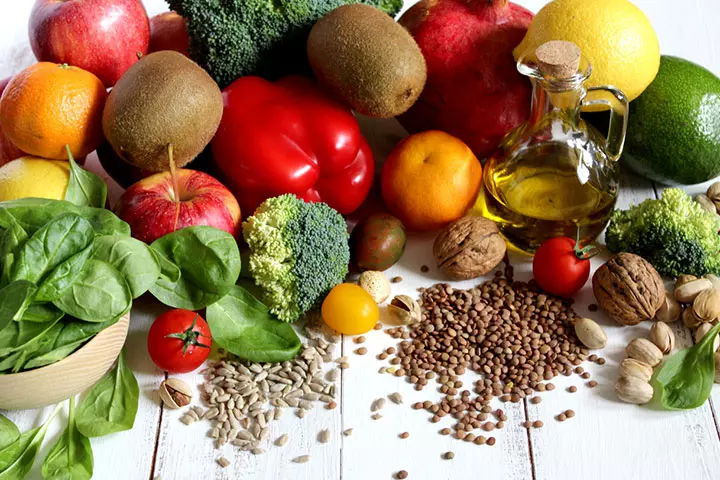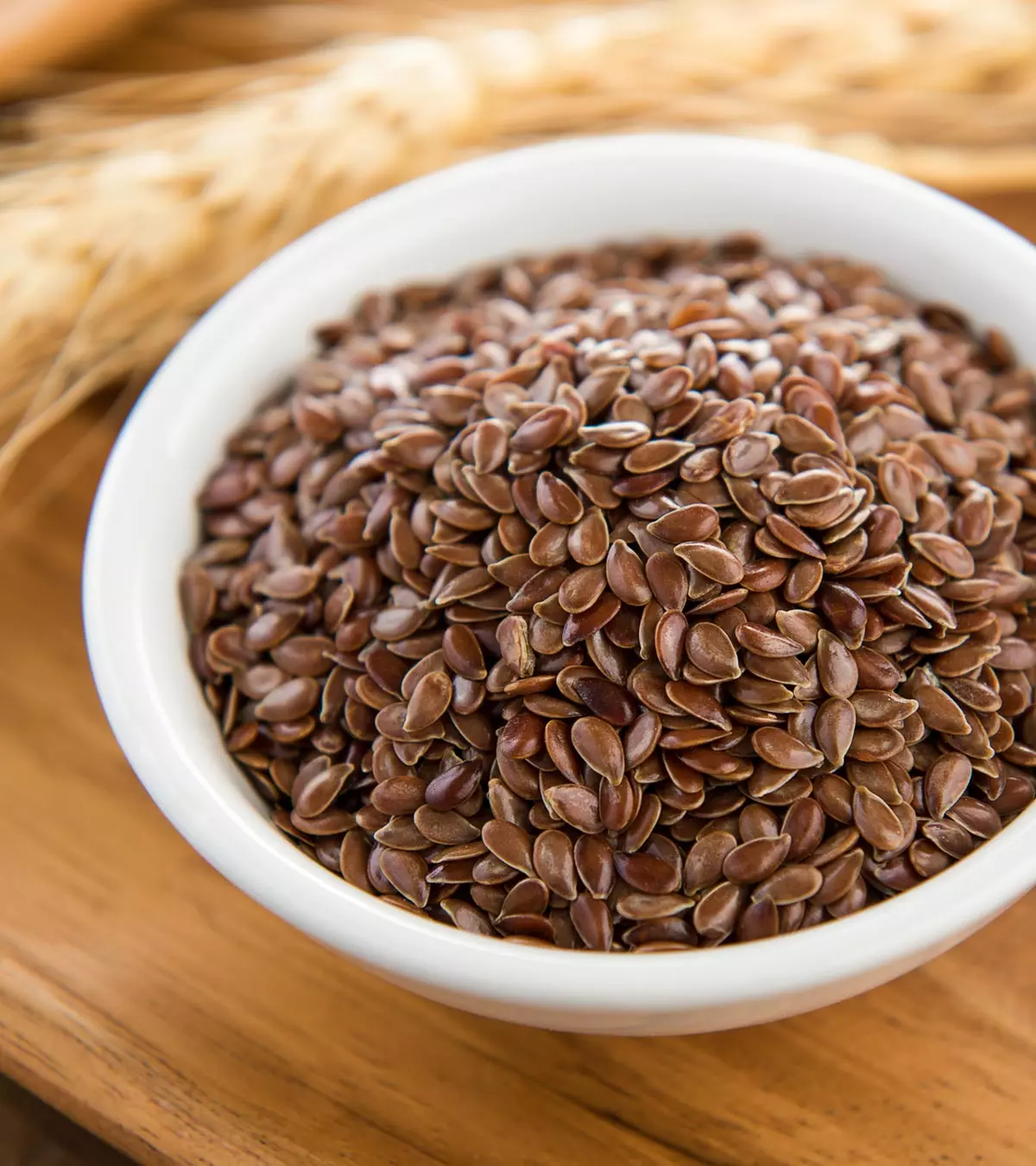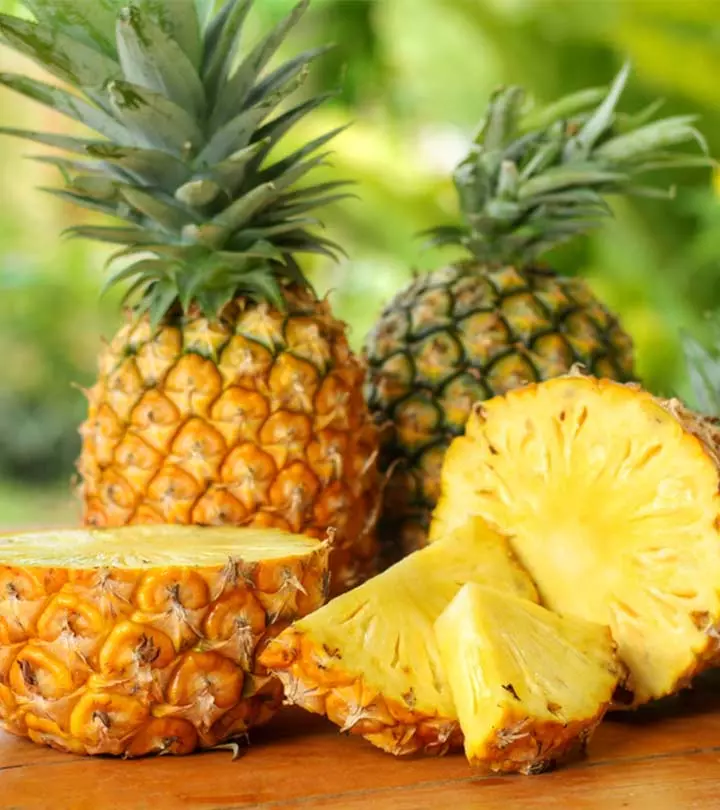
Image: Shutterstock
Many obstetricians advise that mothers eat foods high in vitamin C while breastfeeding. Vitamin C, also known as ascorbic acid, is a water-soluble vitamin mostly found in fruits and vegetables. It is a crucial antioxidant and a typical ingredient in human milk. It also protects and maintains the health of the body’s cells, assists in wound healing, and improves iron absorption.

Since our bodies cannot produce this vitamin, it should be supplemented through our diet. The recommended daily intake of vitamin C for a lactating woman is 120mg, and it is important to ensure that her dietary intake includes this amount. A mother who is healthy and eats a balanced diet would have sufficient amounts of vitamin C in her breast milk (1)
Read this post to learn more about vitamin C and breastfeeding, including the effects of vitamin C on breastmilk and how you can maintain the vitamin C level in your breastmilk.
Key Pointers
- Consuming a vitamin-C rich diet is beneficial when breastfeeding.
- It helps you and your baby fight illnesses by boosting your immune system.
- Vitamin C deficiency can lead to fatigue, scurvy, and anemia.
Benefits Of Vitamin C During Breastfeeding
Every nursing mother needs a supply of nutrients including minerals and vitamins while breastfeeding. Vitamin C is an essential micronutrientiVitamins and minerals, required in small amounts, that are not produced by the body and need to be taken from different sources that plays a vital role in providing nutrition and supporting the proper functioning of the body.
Here are some possible benefits of taking vitamin C during breastfeeding.
- Vitamin C is a cofactor for many enzymes involved in the biosynthesis of collagen, carnitineiA chemical cofactor produced in the kidneys and liver that helps metabolize fat to produce energy , and neurotransmittersiChemical messengers in the brain that send signals throughout the body to carry out different functions . Hence, it aids in the growth of bones and teeth (2).


 Did you know?
Did you know?Dosage And Dietary Sources Of Vitamin C

If you are a nursing mother, you may need to check your vitamin C levels and make sure they are at the recommended levels. For mothers 18 years or younger, the recommended amount is 115mg/day, and for mothers above 18 years, it is 120mg/day (2).
Fresh fruits and vegetables are the best sources of vitamin C, and most nursing mothers can meet their Vitamin C requirement from these food sources. Some foods rich in vitamin C include citrus fruits like oranges and lemon, broccoli, cantaloupe, potato, bell pepper, tomato, kiwi, cauliflower, cabbage, strawberry, and Brussels sprouts (7).
Signs Of Vitamin C Deficiency
The following are the most common signs and symptoms of vitamin C deficiency (8).
- Scurvy
This is characterized by the loss of collageniA structural protein of the body that helps build the connective tissue, skin, bones, and tendons and provides flexibility and weakening of connective tissues and could lead to
- Spots on the skin due to bleeding and bruising of blood vessels.
- Bleeding and swelling of the gums and potential loss of teeth.
- Hair loss.
- Delayed wound healing
- Fatigue and a general feeling of being unwell
- Anemia
Can You Take Vitamin Supplements While Breastfeeding?

The average milk vitamin C concentration is 50-90 mg/L in a well-nourished mother consuming adequate vitamin C in their diet. However, mothers who smoke or have dietary restrictions or low intake of Vitamin C rich foods have lower milk vitamin C levels (1). If you are breastfeeding and diagnosed with low vitamin C levels, consult your doctor for some supplements.
According to a study of mothers who were administered high doses of vitamin C between 250-1,000mg/L daily, the average milk concentration was 100-120mg/L after two days of supplementation. Even when one mother took doses as high as 4,000mg/L vitamin C per day, the breast milk concentration of vitamin C was well below the levels known to cause harm (9). Therefore it is best to consult your doctor for the recommended supplemental dosage.
 Quick fact
Quick factSide Effects Of Excessive Vitamin C
Taking higher concentrations of vitamin C supplements than those recommended by your doctor may have the below side effects
.
- Tissue damage
- Kidney stones
- Diarrhea
- Nausea

- Vomiting
- Heartburn (7)
Make sure you take high-dose vitamin C supplementation only when directed by a physician, especially if you have pre-existing conditions such as kidney disorders.
Frequently Asked Questions
1. Do babies get vitamin C through breast milk?
Yes, vitamin C is passed to babies through their mother’s breast milk. It aids in the proper growth and development of bones and muscles, thereby providing potential breastfeeding benefits to the baby.
2. Does smoking reduce the amount of vitamin C in breast milk?
Yes, studies have shown that smoking may affect the levels of vitamin C and antioxidantsiNaturally found compounds that prevent and reduce the harmful effects that free radicals have on cells in breastmilk (10). Therefore, exercising caution while smoking or quitting altogether is vital to prevent any adverse effects on infant and maternal health.
3. How does vitamin C help with postpartum healing?
Vitamin C has several bodily functions, which can also play a significant role in postpartum healing. For instance, vitamin C facilitates collagen synthesis, which can help heal the tears or incisions that may have happened during childbirth. In addition, vitamin C also helps in tissue repair and rebuilding, strengthening immunity, reducing oxidative stress, and optimum iron absorption, which all help in postpartum healing (12) (13) (14) (15).
Vitamin C while breastfeeding is recommended because it nourishes you and your baby. The vitamin can help provide stronger bones and teeth, faster wound healing, and prevent mastitis. A balanced diet will give you adequate vitamin C required for your body. However, if you notice swelling and bleeding of gums, hair loss, or delay in wound healing, it may be possible that you have a vitamin C deficiency. Seek your doctor’s advice on this matter. They may recommend specific diets or supplements to replenish your needs.
Infographic: Dietary Sources Of Vitamin C Foods During Lactation
Vitamin C is a vital nutrient essential for various functions of the body. The nutrient passes to your baby through breast milk, which can be the only source of vitamin C for exclusively breastfed babies. Therefore, it is vital to include vitamin C-rich foods in your diet. Since what you eat can affect your baby, the following infographic presents breastfeeding-safe vitamin C food sources you can include in your diet.
Some thing wrong with infographic shortcode. please verify shortcode syntaxIllustration: Vitamin C While Breastfeeding: Safety Benefits And Sources

Image: Dall·E/MomJunction Design Team
Feeling tired and run down? Bad teeth? You may have a Vitamin C deficiency, or scurvy. Learn why these symptoms happen and who is most at risk.
References
1. Vitamin C; National Center for Biotechnology Information
2. Vitamin C; National Institutes of Health
3. Shailja Chambial et al.;Vitamin C in Disease Prevention and Cure: An Overview; Indian Journal of Chemical Biology (2013).
4. S Maggini, S Wenzlaff, and D Hornig; Essential Role of Vitamin C and Zinc in Child Immunity and Health; The Journal of International Medical Research (2010).
5. A. A. Fulton; Value Of Supplements Of Vitamin C In Preventing Lactational Mastitis; The British Medical Journal (1945).
6. U Hoppu et al.; Vitamin C in breast milk may reduce the risk of atopy in the infant; European Journal of Clinical Nutrition (2004).
7. Nutrition Tips for Breastfeeding Mothers; The Regents of The University of California
8. Vitamin C; Harvard TH Chan
9. Jason B. Sauberanl; High-Dose Vitamins; Breastfeeding Medicine (2019).
10. Rosa M. Ortega et al.; The Influence of Smoking on Vitamin C Status During the Third Trimester of Pregnancy and on Vitamin C Levels in Maternal Milk; ResearchGate.
11. Healthy eating for breastfeeding; UK Government
12. Nutrition after childbirth; The Open University
13. Focus on Family Wellness: Promoting Postpartum Support and Recovery; Triangle Area Parenting Support
14. Biochemistry, Collagen Synthesis; Statpearls, NCBI
15. Food and beverages; Allina Health Patient Education
Community Experiences
Join the conversation and become a part of our nurturing community! Share your stories, experiences, and insights to connect with fellow parents.
Read full bio of Regina Kincaid
Read full bio of Swati Patwal
Read full bio of Rohit Garoo
Read full bio of Anindita Ghatak


















